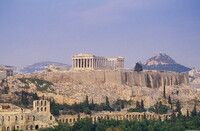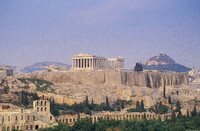| dc.coverage.spatial | Site: Athens, Periféreia Protevoúsis, Greece | en_US |
| dc.coverage.temporal | ca. 480-393 BCE (creation) | en_US |
| dc.creator | unknown (Greek (ancient)) | en_US |
| dc.date | -500--300 | en_US |
| dc.date.accessioned | 2013-05-21T19:56:11Z | |
| dc.date.available | 2013-05-21T19:56:11Z | |
| dc.date.issued | -500--300 | en_US |
| dc.identifier | 219935 | en_US |
| dc.identifier.other | archrefid: 472 | en_US |
| dc.identifier.uri | http://hdl.handle.net/1721.3/127826 | |
| dc.description | Distant view of the Acropolis, from southwest, on the Filopappos Hill; The earliest significant architectural remains on the Acropolis, only date to the 13th century BCE. They include a terrace system that may have supported a palace complex. Athens was a major regional power and artistic centre under different political regimes from the 6th to the 4th century BCE. Around the 6th century BCE, the Acropolis, hitherto a place of refuge and perhaps a royal residence, assumed a purely religious function as a sanctuary of Athena, the patron goddess of the city, and many temples, treasuries and votive sculptures were erected there. Source: Grove Art Online; http://www.groveart.com/ (accessed 2/10/2008) | en_US |
| dc.format.medium | marble | en_US |
| dc.rights | © Scott Gilchrist, Archivision, Inc. | en_US |
| dc.subject | architectural exteriors | en_US |
| dc.subject | deities | en_US |
| dc.subject | mythology (Classical) | en_US |
| dc.subject | Greek (ancient) | en_US |
| dc.title | Athens Acropolis [site] | en_US |
| dc.type | image | en_US |
| dc.rights.access | Licensed for educational and research use by the MIT community only | en_US |
| dc.identifier.vendorcode | 1A3-G-A-1-A3 | en_US |
| vra.culturalContext | Greek (ancient) | en_US |
| vra.technique | construction (assembling) carving (processes) | en_US |
| vra.worktype | excavation (site) | en_US |
| vra.worktype | fortification | en_US |
| dc.contributor.display | unknown (Greek (ancient)) | en_US |



